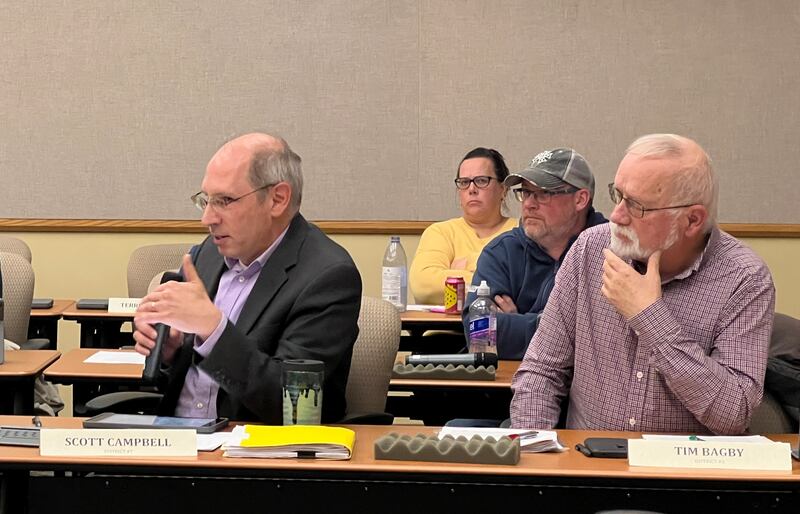SYCAMORE – DeKalb County Democrats and Republicans unanimously agreed this week not to enact a 1% grocery tax on unincorporated areas of the county, although some municipalities still are considering it within city limits.
Scott Campbell, a DeKalb County Board Democrat from District 7 who also chairs the board’s finance and administration committee, said he was against the tax.
“Here’s the thing: This taxes food, and there’s something really evil about taxing food,” Campbell said. “If you’re right at the margin, that 1% matters.”
Tim Bagby, a Republican board member from District 3 who also chairs the county’s Republican Party, said he agreed with Campbell.
“All taxation is regressive, not just tax on food,” Bagby said.
Over recent weeks, various DeKalb County municipalities have considered enacting a 1% tax on groceries to replace a 1% state tax on groceries that expires in January. Although Gov. JB Pritzker cited a desire to ease Illinoisans’ grocery bill burdens, some municipal leaders across the state have bemoaned the effect that lost tax revenue will have on local budgets.
Sycamore has received more than $700,000, or about 3% of its annual budget, through the state grocery tax since at least 2022, according to city documents. DeKalb officials estimate their share of the state grocery tax to be as much as $800,000. Neither municipality has put the tax to a final vote.
[ Council backs Sycamore 1% grocery tax in early talks; final vote still needed ]
DeKalb Mayor Cohen Barnes has said not replacing those funds would mean cuts to police, fire or human services funding. Sycamore City Manager Michael Hall said residents wouldn’t notice a difference if the tax was kept in place but enacted locally instead.
Campbell said he doesn’t think the lack of the 1% grocery tax would have the same impact to DeKalb County’s $37.7 million annual budget. That’s because a countywide tax would only tax grocery items purchased at places outside of municipal limits. Most grocery stores in the county are in its more populated municipalities, DeKalb or Sycamore.
“This is a tiny amount of money for us,” Campbell said. “This is a five-figure maximum amount of money. If we were the city of DeKalb, it would be a whole different story.”
During the meeting, Bagby asked, “Who’s bright idea in the staff office was it to put this on the agenda?”
Campbell said it wasn’t his.
“It was nobody’s idea in particular,” Campbell said. “The state is expiring this tax, so we are more or less obliged to bring it to taxpayers by way of responding.”
The DeKalb County Board finance and administration committee unanimously voted against recommending the tax May 7. Some county officials said they think the idea should have stopped there.
“This is a tiny amount of money for us. This is a five-figure maximum amount of money. If we were the city of DeKalb, it would be a whole different story.”
— Scott Campbell, DeKalb County Board member
DeKalb County State’s Attorney Civil Bureau Chief David Berault said that usually a unanimous vote against an idea would mean the agenda item doesn’t advance to the full County Board. Campbell said the committee advanced the 1% tax to the board, despite its unanimous opposition, so that the full board could vote on the matter.
“In my opinion, it was killed in committee, so unless you disagree with me, which you are welcome to do, you don’t have to vote on it,” Berault said.
Republican DeKalb County Board Chair John Frieders asked former board Chair Ellingsworth Webb, a Democrat, to withdraw his motion for a vote on the matter after Berault’s comments. Webb did not agree, however.
When DeKalb County Clerk Tasha Sims entered the County Board into a roll call vote, not a single member voted in favor of the tax.

:quality(70)/author-service-images-prod-us-east-1.publishing.aws.arc.pub/shawmedia/114d2561-d902-4313-913c-3ed613087b49.png)